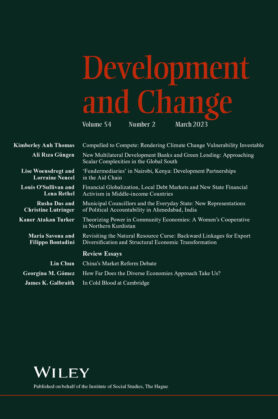Development and Change Vol. 54 No. 2 March 2023
The concept of formalization has long underpinned policy interventions and measures intended to connect informal entities with state institutions or formal economic structures. However, despite the policy enthusiasm, the outcomes of formalization policies have frequently been disappointing. This article argues that this disconnect lies in the concept of formalization itself and that common approaches to formalization are often rooted in three conceptual fallacies: a binary distinction between formal and informal economic actors, a lack of appreciation for the diversity of informal economic actors and the idea that ‘becoming’ formal necessarily spurs positive externalities. These conceptual confusions pay insufficient attention to contextual complexity and the political and social dynamics that shape informality in a given context and they are frequently rooted in the practicalities and power structures that shape knowledge creation in this area. This article demonstrates this through case studies of tax registration and property titling. Thus, it argues for a new research agenda on formalization that challenges both its conventional conceptual foundations and the practices of research that engage with it.
